
Charades is a parlor or party word guessing game. Originally, the game was a dramatic form of literary charades: a single person would act out each syllable of a word or phrase in order, followed by the whole phrase together, while the rest of the group guessed. A variant was to have teams who acted scenes out together while the others guessed. Today, it is common to require the actors to mime their hints without using any spoken words, which requires some conventional gestures. Puns and visual puns were and remain common.
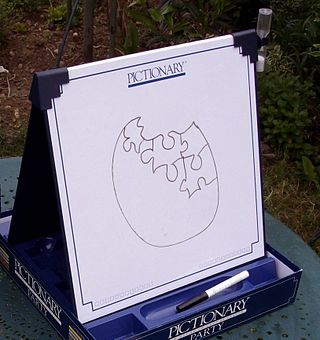
Pictionary is a charades-inspired word-guessing game invented by Robert Angel with graphic design by Gary Everson and first published in 1985 by Angel Games Inc. Angel Games licensed Pictionary to Western Publishing. Hasbro purchased the rights in 1994 after acquiring the games business of Western Publishing. Mattel acquired ownership of Pictionary in 2001. The game is played in teams with players trying to identify specific words from their teammates.

Taboo is a word, guessing, and party game published by Parker Brothers in 1989. The objective of the game is for a player to have their partners guess the word on the player's card without using the word itself or five additional words listed on the card.

Password is an American television game show in which two teams, each composed of a celebrity player and a contestant, attempt to convey mystery words to each other using only single-word clues, in order to win cash prizes.
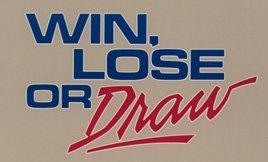
Win, Lose or Draw is an American television game show that aired from 1987 to 1990 in syndication and on NBC. It was taped at CBS Television City, often in Studios 31, 33, and 43 at various times. It was co-produced by Burt & Bert Productions and Kline & Friends for Disney's Buena Vista Television. It has also had two versions on The Disney Channel: Teen Win, Lose or Draw from 1989 to 1992, and a revived version known as Disney's Win, Lose or Draw which aired in 2014. New York described Win, Lose or Draw as "a knockoff" of the board game Pictionary, however, Burt Reynolds and Ed McMahon referred to playing the game at Burt's home during the August 2, 1978 episode of The Tonight Show, with Johnny Carson, three years before Pictionary was created.

Now You See It is an American television game show created by Frank Wayne for Mark Goodson-Bill Todman Productions. The object of Now You See It is to answer general knowledge trivia questions by finding the answers hidden in a grid, similar to a word search puzzle.

Chain Reaction is an American television game show created by Bob Stewart, in which players compete to form chains composed of two-word phrases.
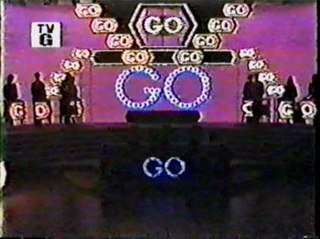
Go is an American television game show created by Bob Stewart and aired on NBC from October 3, 1983, to January 20, 1984. The show featured two teams, each composed of four contestants and a celebrity. The teams had to construct questions one word at a time to convey a word or phrase to their teammates. The concept of Go was based on "Instant Reaction", an endgame played on two different iterations of another game show created by Bob Stewart, Chain Reaction, in 1980 on NBC and from 2006–07 on GSN.

Body Language is an American game show produced by Mark Goodson Productions. The show aired on CBS from June 4, 1984, until January 3, 1986, and was hosted by Tom Kennedy. Johnny Olson announced until his death in October 1985; Gene Wood and Bob Hilton shared the announcing duties afterward, having substituted on occasion before then.

Blackout is an American game show that was broadcast on CBS as part of its daytime schedule from January 4, 1988 until April 1, 1988. The program was created and produced by Jay Wolpert. The game features two contestants, each paired with a celebrity. Contestants attempt to solve word puzzles consisting of a sentence or short paragraph with four blank spaces. Players guess each missing word based on hearing clues recorded by their partner, but with the playback being muted or "blacked out" at certain places by their opponent.
Codex is a game show that aired on Channel 4 from 12 November 2006 to 15 December 2007 and was hosted by Tony Robinson.
The (£1,000) Pyramid Game is a United Kingdom game show based on the American format of the same name that was originally shown on ITV from 1981 to 1984 then 1989 to 1990 hosted by Steve Jones, then revived by Challenge in 2007 hosted by Donny Osmond.
Celebrity is a party game similar to Charades, where teams play against each other to guess as many celebrity names as possible before time runs out.
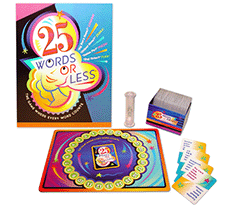
25 Words or Less is a party board game in which two teams of players take turns bidding words back and forth, until one team allows the other to try to give that number of clues to their team to try guessing five words from a card in only one minute. It was first published by Winning Moves Games USA in 1996 and was republished in 2006 as 25 Words or Less: People, Places and Things Edition. The game is no longer in production.
Pyramid is an Australian children's quiz show screening on the Nine Network from 2009 to 2015 hosted by Shura Taft. It is co-produced by Sony Pictures Television and produced by Sydney-based Ambience Entertainment. It began broadcasting on 1 September 2009 and is filmed in front of a live studio audience. It involves two teams competing in games of "vocal charades". The show is based on the 1979 United States game show The Junior Partner Pyramid, a children's variant of the Sony Pictures Television Pyramid franchise.
Family Game Night is an American television game show based on Hasbro's family of board games and EA's video game franchise of the same name. The show was hosted by Todd Newton. Burton Richardson was the announcer for the first two seasons; he was replaced by Stacey J. Aswad in the third season, and Andrew Kishino was hired for the fourth season. The 60-minute program debuted on October 10, 2010, on The Hub ; it was previewed on October 9, 2010, on its sister channel, TLC. Seasons 1 and 2 contained 26 and 30 episodes respectively. Seasons 3, 4 and 5 each contained 15 episodes. Season 2 premiered on Friday, September 2, 2011, with additional games being added. The games added to the second season included Cranium Brain Breaks, Green Scream, Ratuki Go-Round, Simon Flash, Operation Sam Dunk, Trouble Pop Quiz, and Spelling Bee. However games from the previous season were still kept.
Spit It Out is an Australian children-oriented game show hosted by Elliot Spencer. The series premiered on 4 October 2010, in an afternoon time-slot, replacing It's Academic after its series 12 finale. Spit it out was originally invented by Alan Curtis as a board Game. This game was then further developed by Grant Rule and Alan Curtis into a Television game show.

Ellen's Game of Games, also known as Game of Games and stylized as ellen's GAME OF GAMES, is an American television game show that aired on NBC. In March 2017, NBC ordered six hour-long episodes of the series. Ellen DeGeneres serves as host, while Stephen "tWitch" Boss appears as announcer/sidekick. The series is based on game segments from DeGeneres' daytime talk show, The Ellen DeGeneres Show. The series premiered on December 18, 2017. On February 18, 2020, DeGeneres announced on The Ellen DeGeneres Show that the series was renewed for a fourth season, which began airing on October 6, 2020. In January 2022, the series was canceled after four seasons.
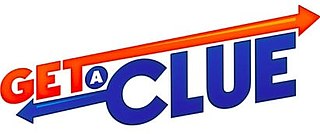
Get a Clue is an American television game show hosted by Rob Belushi that aired on Game Show Network from January 6, 2020 to April 16, 2021.
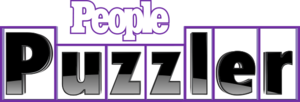
People Puzzler is an American television game show hosted by Leah Remini and broadcast by Game Show Network. It premiered on January 18, 2021. The show is inspired by the celebrity and pop-culture themed crosswords in People magazine.















